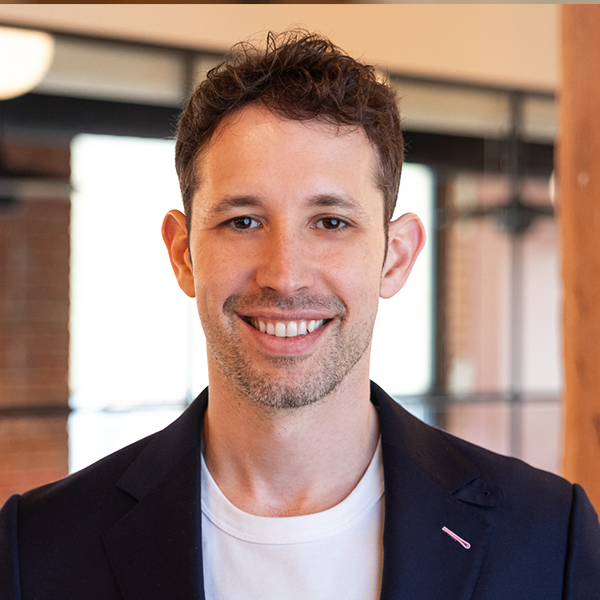Two years ago, we introduced Scale Up talks at BenchSci. These talks invite external leaders in the technology and AI space who have experience growing and scaling companies to join our team for a candid discussion and open Q&A. These conversations are one of the ways we bring our team together (virtually) to learn from people who have been very successful and understand the complexities of scaling a company.
Our first guest of the year was Steve Hitchcock. Steve is a seasoned leader in pharma and biotech. He spent the past decade at Takeda Pharmaceuticals as the Chief Scientific Officer and Head of Global Research. He is now the founder and CEO of Implexsys Bioscience, a Venture Partner at 5AM Ventures, and a member of our scientific advisory board.
Our discussion covered artificial intelligence (AI) in preclinical R&D, the hurdles of adopting new technology, and finding one’s calling. Here are some key takeaways from our conversation:
The biggest opportunity for AI in preclinical R&D is unraveling disease biology
AI’s impact on drug design is already significant, but Steve believes its greatest potential lies in unraveling disease biology. He acknowledges the challenge of proving this impact: "The latency there to actually prove that you made a difference is so long that our grandchildren may actually see the results from that in terms of marketed therapeutics.”
Despite this, Steve emphasized that one of AI's headwinds is its ability to guide scientists in a better direction.
“BenchSci has put front and center understanding the risk of mechanism, safety risk in particular. With Risk Defender, you can get data back relatively quickly, so within weeks or months, you can figure out if you have a major safety risk with the mechanism you’re pursuing.”
Scientists are skeptical by nature
Adopting new AI technologies in pharmaceutical organizations can be challenging due to inherent scientific skepticism. Scientists are programmed to ask questions and challenge results and data. The key to success lies in demonstrating that AI doesn’t replace scientists but rather empowers them.
“If you can convince a scientist that your technology will enable them to move faster, be more productive, and enhance their work, that’s how you’ll see their adoption. If you can get a few scientists to buy into that, it will spread like wildfire.”
Stay focused on your long-term vision
“AI will make a massive difference. It may just take another decade to see the results. Remain calm, think about the long-term investments you’re making,” says Steve. He believes that if you’re successful in this space, the needle will move massively. Part of your long-term success relies on your ability to demonstrate your short-term value and impact.
The reality of drug discovery is there’s a high rate of failure for preclinical research. Pharmaceutical companies routinely spend billions of dollars and upwards of 20 years developing new drugs, only to have most of them fail in clinical trials. When you bring new therapies to market, a 5% savings is huge. Steve emphasizes the promising data supporting AI's impact on drug discovery, “we see the improvement in the phase 2 success rate is better for AI drugs than non-AI drugs.”
The biotech model is familiar
We explored why investors might be hesitant to fund the development of new AI tools for scientists, even though they could revolutionize the industry, versus sticking with the tried-and-true biotech model. Steve says it boils down to risk: AI is new and constantly evolving. Sure, higher risk can mean bigger rewards, but the biotech model offers a safer, more secure, and more predictable outcome. They know the lay of the land and what to expect.
AI is rapidly changing, and big pharma is still in the early stages of adopting the technology. As a result, investors are drawn to the hybrid approach: biotech models that leverage AI's power while offering the reassuring familiarity of traditional methods. It's a way to get a taste of the future without sacrificing the stability of the present.
For companies like BenchSci, Steve believes these solutions will have a tremendous impact on the future of drug discovery.
Stay curious
Steve, driven by a lifelong curiosity, emphasizes finding purpose in work. He advises focusing on passions, strengths, and making a positive impact, as "that's the secret to a rewarding life."
Steve's lifelong curiosity fueled his passion for science and shaped his career. Driven by the potential of science to benefit humanity and patients, he emphasizes a holistic view of success, encompassing happiness, well-being, and financial rewards. For Steve, the greatest reward is seeing his work benefit patients. While this is rare due to the long drug development process, he’s experienced it firsthand a few times. His voice lights up when he recounts seeing clinical data and hearing stories of patients whose lives were transformed by the drugs he helped create.
Curiosity fuels scientific breakthroughs, just as it did for Steve. At BenchSci, we share that same passion for discovery as we embark on our journey to revolutionize drug discovery. Explore our blog posts to learn how curiosity sparks innovation and real-world impact through our Scale Up talks.
